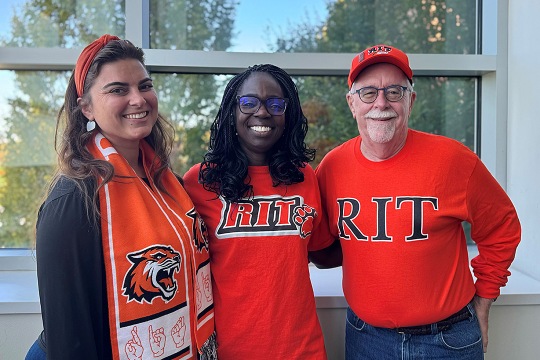NTID AlumniNews
Campus competition kickstarts grad’s acting career

Stephanie Nogueras ’11 (applied liberal arts) credits her lucky break to an RIT fashion competition that launched an unlikely acting career.
As a student at RIT’s National Technical Institute for the Deaf, Nogueras focused on academics, working steadily toward completing her degree and finding a job. In search of a much-needed break from her studies, she signed up to participate in the university’s Tiger’s Next Top Model competition, based on the popular show America’s Next Top Model. Nogueras won the competition.
Photos from the event, along with others taken of her as a model for student photography projects, were uploaded to Facebook where they were seen by a talent manager in Los Angeles. The rest is history.

Nogueras appeared in an episode of the Fox drama Accused, directed by Marlee Matlin, right. Image courtesy of Fox.
“She asked me if I ever considered acting or modeling after graduation, which I hadn’t,” said Nogueras, a shy child who grew up deaf in a hearing Puerto Rican family in New Jersey. “I had always enjoyed dancing but never thought about being in front of the camera.”
After graduation, Nogueras moved to LA and, soon after, landed her first major role as Natalie Pierce on ABC Family’s Switched at Birth, before an appearance on the TV show Grimm. In 2018, she starred in the horror film Unfriended: Dark Web, followed by roles on Criminal Minds, American Diablo, and The Good Fight and leads in Killing It and the Fox crime anthology Accused.
“I love acting. It’s thrilling—and challenging—to be someone else, to play different characters,” she said. “I never thought I would have this kind of life at all.”
In addition to her on-screen career, Nogueras is a motivational speaker and the founder of Pepita Productions, which provides support for actors identifying as Latinx/a/o. As a result of her own experiences, she hopes to create safe spaces for actors to share feelings, express thoughts on the industry, and seek mentorship.
“When I started, I didn’t have any mentors who were like me, and that was really frustrating. I want to create opportunities for them to be a part of something like this. My goal is to break down barriers and stereotypes.”
She also hopes her exposure will lead to increased conversations within families.
“My own Puerto Rican family never thought that their deaf child would grow up to have these amazing experiences. It’s important to me that these children have healthy relationships within their own families and see that anything is possible for them.”
As for her time at RIT, she credits her experiences interacting with other deaf and hearing students in and out of the classroom with boosting her independence, confidence, and self-worth, and helping her hone in on her identity.
This story originally appeared in RIT News.








